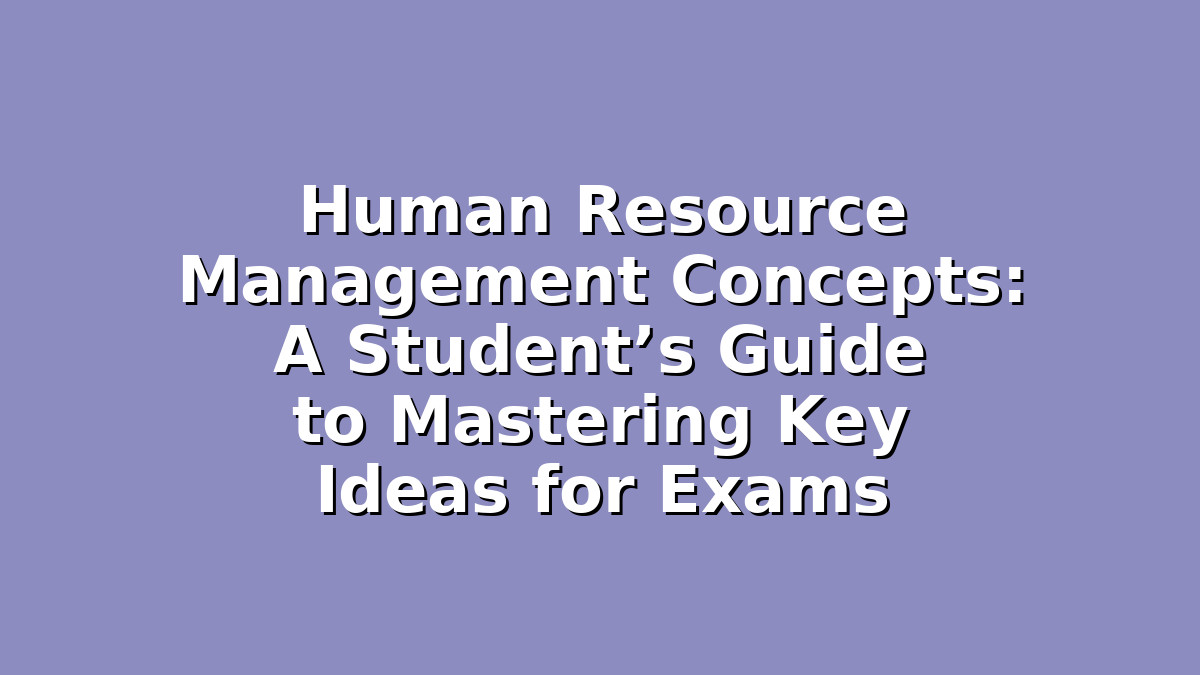Preparing for exams can be overwhelming, especially when tackling complex subjects like Human Resource Management (HRM). Whether you’re a business student, pursuing HR as a specialization, or just looking to grasp essential management concepts, understanding HRM thoroughly is crucial. This article breaks down the fundamental HRM concepts and provides effective study tips to help you excel in your exams with confidence.
Introduction to Human Resource Management
Human Resource Management is a vital function in organizations that focuses on recruiting, managing, and developing a company’s workforce. It ensures that the organization’s human capital contributes effectively to achieving business goals. HRM covers various concepts ranging from hiring and training to performance management and employee relations.
For students, grasping these concepts means not just memorizing definitions but understanding how HR practices impact businesses and employees alike. With exams approaching, let’s explore three core HRM areas—Recruitment and Selection, Training and Development, and Performance Management—along with targeted study strategies to boost your retention and application skills.
—
1. Recruitment and Selection: Finding the Right Talent
Recruitment and selection are the first steps in building a strong workforce. Recruitment involves attracting qualified candidates, while selection is about choosing the best fit for the role and organization. Key concepts to focus on include job analysis, sourcing methods, selection tools (interviews, tests), and legal considerations.
Why it matters: A good recruitment process reduces turnover costs and improves productivity by hiring employees who align with company culture and job requirements.
Study tips for Recruitment and Selection:
– Create concept maps: Visualize the recruitment process from job analysis to final selection. Mapping each step helps you see the flow and interconnections clearly.
– Use real-world examples: Think about companies you know and how they might recruit or select employees. Applying theory to practice makes concepts easier to remember.
– Practice case studies: Exams often include scenario-based questions. Practice by summarizing recruitment challenges and proposing solutions based on HRM theory.
– Memorize legal aspects carefully: Employment laws like anti-discrimination policies can be tricky. Use flashcards and quiz yourself repeatedly to ensure you recall important regulations.
—
2. Training and Development: Enhancing Employee Skills
Once employees are hired, training and development ensure they continue to grow and contribute effectively. Training focuses on short-term skill-building, while development aims at long-term career growth. Topics include types of training (on-the-job, off-the-job), learning theories, needs assessment, and evaluation of training effectiveness.
Why it matters: Well-trained employees improve organizational performance and adapt better to changes.
Study tips for Training and Development:
– Break down learning theories: Concepts like behaviorism, cognitive learning, and experiential learning can be abstract. Create simple summaries or analogies to understand how each theory applies to training.
– Link training methods to outcomes: Match specific training methods with the benefits they provide. For example, on-the-job training offers hands-on experience, which is great for manual skills.
– Develop mnemonic devices: Use acronyms or rhymes to remember the steps in training needs analysis or evaluation models like Kirkpatrick’s Four Levels.
– Engage in group discussions: Study with peers to debate the pros and cons of different training approaches. Explaining concepts to others reinforces your own understanding.
—
3. Performance Management: Measuring and Improving Employee Output
Performance management includes setting performance standards, monitoring employee output, providing feedback, and implementing improvement plans. It covers appraisal methods (self-assessment, 360-degree feedback), goal setting (SMART goals), and handling underperformance.
Why it matters: Effective performance management aligns employee efforts with organizational objectives, boosting motivation and results.
Study tips for Performance Management:
– Understand appraisal techniques deeply: Draw comparisons between different appraisal methods and their suitability for various roles or industries.
– Practice writing SMART goals: Since exams may ask for examples, create specific, measurable, achievable, relevant, and time-bound goals related to hypothetical job scenarios.
– Use past exam questions: Reviewing questions on performance management helps you identify commonly tested topics and practice articulating your answers.
– Role-play feedback sessions: Practice giving and receiving feedback with classmates. This experiential learning improves your grasp of constructive communication and conflict resolution.
—
Conclusion: Mastering HRM Concepts for Exam Success
Human Resource Management is a dynamic field that combines theory with practical application. To prepare effectively for your exams, focus on understanding the key concepts behind recruitment, training, and performance management rather than rote memorization. Use visual aids, real-life examples, and active learning techniques like group discussions and role-plays to deepen your comprehension.
Remember, consistent practice and a positive mindset are your best allies. Break your study sessions into manageable chunks, and reward yourself for progress. With dedication and the right strategies, you’ll not only ace your HRM exams but also gain valuable knowledge that will serve you well in your future career.
Keep going—you’ve got this!

Responses